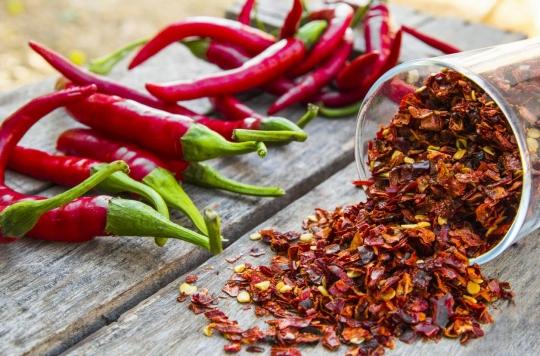Capsaicin, the substance that irritates and burns the stomach when eating red pepper, could help fight metastases better.

Consume very hot drinks could increase the risk of developing esophageal cancer while eating nuts would help against recurrence of colon cancer. And concerning lung cancer, it is the red pepper that would be beneficial. Indeed, according to an American study presented at the annual meeting of the American Society for Investigative Pathology which is held from April 6 to 9 in Orlando, Florida (United States), the capsaicin contained in this food would slow down the development of lung cancer, both in men and in women.
During their study, researchers from the Joan C. School of Medicine at Marshall University in West Virginia (USA) studied cells from humans with non-small cell lung cancer in the laboratory. They were thus able to notice that capsaicin, a chemical compound from the family of alkaloids, an active component of pepper, inhibited invasion, the first step in the metastatic process of cancer. They also found that mice with metastatic cancer who ate capsaicin had fewer metastatic cancer cells in the lung compared to those who did not.
In detail, the researchers found that capsaicin suppressed lung cancer metastasis by inhibiting the activation of the Src protein. The latter plays an important role in signaling controlling cellular processes such as proliferation, differentiation, motility and adhesion.
Anti-cancer properties but lots of nasty side effects
“Lung cancer and others usually metastasize to secondary locations such as the brain, liver or bone, making them difficult to treat,” says Jamie Friedman, who was involved in the research. “Our study shows that capsaicin could represent a new therapy to combat metastasis in patients with lung cancer.” Eventually, “we hope that it can be combined with other chemotherapeutic agents to treat various lung cancers”, he continues.
“However, it will have to overcome its unpleasant side effects,” he warns. Indeed, capsaicin is known to cause gastrointestinal irritation, heartburn and stomach cramps. This is why Jamie Friedman and his colleagues are currently working to identify natural compounds with the same anti-cancer properties but which would be less “spicy” for the body.
In France, there are approximately 32,000 new cases of lung cancer each year in men and more than 16,000 in women. With approximately 31,000 deaths per year, it is the leading cause of cancer death in men (67% of deaths) and the second in women. It has also increased sharply among women since 1980, probably because women smoke more than before. Tobacco is by far the leading cause of the disease. It is indeed responsible for more than eight out of ten cases. In men, on the other hand, the incidence of lung cancer has been relatively stable since 1990, while mortality has been decreasing since 1995.


















